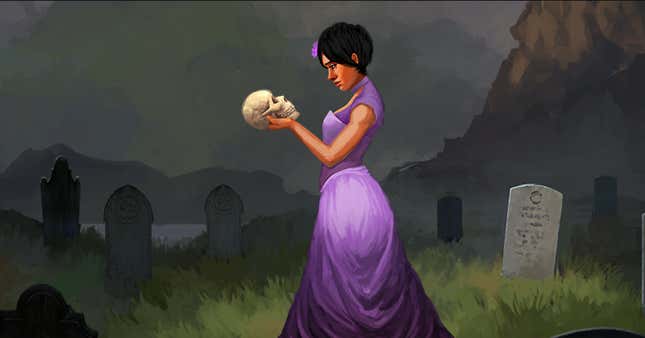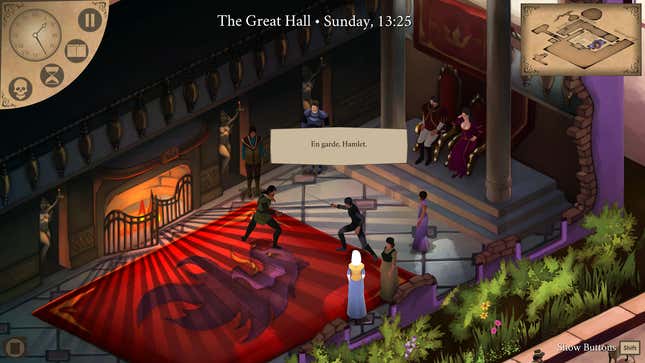
Aside from the Bible and other great religious works, it seems fair to say that William Shakespeare’s plays are among the most far-read stories in the world. Of those, Hamlet might be the most well-known. A murdered king, a brother who marries the widowed queen, a woe-stricken son who plots revenge and everyone dies. Or do they? In Elsinore, available now on PC, Mac, and Linux, you play as the normally doomed Ophelia and experience the tragedy in real time, searching for a way to prevent it.
When my co-worker Nathan Grayson covered Elsinore years ago, he called it “Hamlet meets Majora’s Mask.” That’s both on the mark and not entirely right. Elsinore has less in common with Majora’s Mask than it does with Jordan Mechner’s underrated 1997 mystery game The Last Express. In that game, players explored a train in real time, trying to stop a terrorist plot and solve a murder. Take too long snooping somewhere and you might miss a key conversation elsewhere. Elsinore operates on a similar principle. Ophelia, Hamlet’s love interest, experiences a dream of the upcoming tragedies at Elsinore Castle. It’s her job to experience the story of Hamlet, going wherever the player wants as the rest of the cast acts out the story.

I have to imagine that Elsinore’s design team is intimately familiar with the site-specific play Sleep No More, which allows audience members to wander a giant warehouse space to similarly experience Shakespeare’s Macbeth in real time. That means you can wander around and try to follow the whole plot or just watch a single actor for hours. Elsinore operates on that principle, with a little bit of adventure game-y dialogue trees tossed in for good measure. By wandering the castle grounds, it’s possible to overhear events or interject into affairs such that you learn new information. For instance, it’s possible to hear King Cladius’ famous church confession that he murdered his brother. But now that you have that information, what do you do? Do you run and tell the queen? Maybe she believes you, maybe she thinks you’re mad. Hell, maybe it paints a target on your back and ends in a whole new tragedy.
Death is a key feature of Elsinore. Not only is is possible to stumble into fresh tragedies, but there’s also a spy in the castle looking to destabilize affairs. Waste too much time or wander down the wrong path at night and you might end up assassinated. The catch is that Ophelia simply wakes up in her bed, Groundhog Day style. Your journal keeps key information and a nifty calendar helps track when major events are happening, which you can then use to attempt to alter history. Maybe you help Hamlet kill his uncle. Maybe you find a way where no one has to die. On your first few lives, you’re stumbling in the dark and barely able to change affairs. Slowly but surely, your knowledge increases, and you can prevent key events from happening or find key evidence in hidden places that you couldn’t have known about at first.
As a theater major who took an extended yearlong study on Hamlet, I’m incredibly biased toward Elsinore. (Seriously, that’s a thing I did. I spent a year studying just one Shakespeare play instead of learning HVAC repair or something useful.) I wish more games experimented with the presentation styles of other mediums, like the variable frame rates of film or the spatial considerations of theater. 2017’s Tacoma experimented with space station logs that had multiple things happening at once, forcing you to go room to room to get a complete picture. Elsinore wears its theater inspirations on its sleeve and, in the process, creates a compelling mystery where players needs to really learn daily routines, castle layouts, and dialogue strategies. The slow pace might not be for everyone, but players willing to endure a few tragic deaths and existential loops will find a clever adventure game worth snooping through.